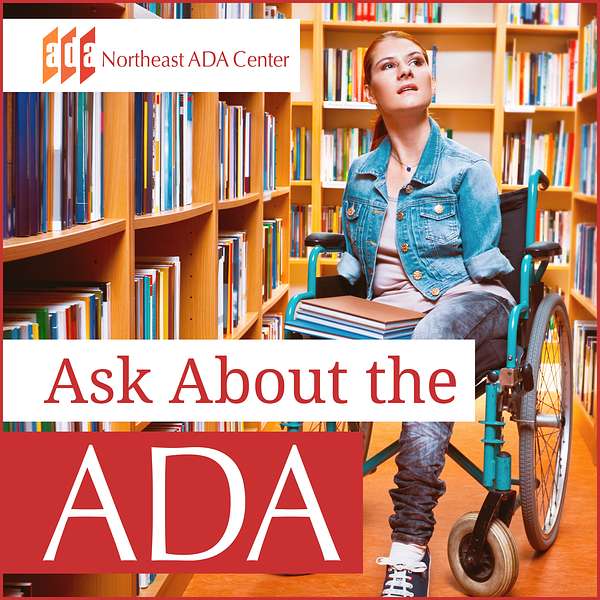
Ask About the ADA Podcast
The podcast answers frequently asked questions about the Americans with Disabilities Act and explores the rights and responsibilities of people with disabilities under the law.
Ask About the ADA Podcast
Ask About: Accessibility in Academic and Legal Documents
•
Northeast ADA Center
•
Season 1
•
Episode 12
Do videos for college classes have to include closed captioning? Do courts have to provide lawyers with accessible versions of legal documents? This edition of Ask About the ADA includes questions about accessibility for academic and legal materials online. For a transcript of today's episode, please visit the Ask About the ADA podcast feed on BuzzSprout.
Read more about college course closed captioning and legal document accessibility.
NortheastADA.org
JOE ZESSKI: Hello and welcome to this edition of Ask about the ADA, the podcast where we answer your frequently asked questions about the Americans with Disabilities Act and other disability-related issues. [MUSIC PLAYING] JOE ZESSKI: I am Joe Zesski with the Northeast ADA Center. On today's episode, we're going to look at two questions about online or electronic accessibility. So let's look at the first question. Must videos for online college classes have closed captions? Well, we've certainly seen a rise in this type of question over the last several years. And that's probably due to a couple of different factors. One, there's a much greater awareness of the need for online accessibility in general that's been increasing over, I'd say the last four or five years in particular. But of course, in addition to that, we have the advent of the COVID-19 virus, which has forced a lot of changes, including a lot of colleges and universities offering online classes exclusively. So with that all happening, we've seen a rise in this type of question and here's what it comes down to. Under the Americans with Disabilities Act, as well as Section 504, colleges and universities do have to make sure that their courses are offered in a way, in a manner that is accessible to people with disabilities. They have to ensure that any course-related communication is equally effective for people with disabilities as for that offered to people without disabilities. So naturally, this would include any videos that are part of the instructional course. Now, in regards to the types of caption being offered, that's a different question. There should be and needs to be captions. However, it's up to the university or college to decide whether they want to offer closed or open captions. Either option is available, but we know that we have to make sure that the audio content is accessible. So therefore, some form of captions should be incorporated into any video content. [MUSIC PLAYING] JOE ZESSKI: And here's our second question. I am an attorney who uses a screen reader due to my disability. I have a case in my circuit court. Must the court provide me with accessible versions of electronic documents? Well first, let's look at this question in terms of what part of the ADA does this apply to. Since we're talking about a court situation where you have to begin with Title II. And Title II, of course, is a part of the ADA that covers what are called public entities. Those are state and local government and all their related agencies and instrumentalities. So not only would it include things like the court system at various levels, but it also would include, generally speaking, many law enforcement agencies, obviously any city, state, or county law enforcement. It also would cover things that you might think of completely unrelated to that like public colleges, a public library, town or county functions. All those things could be considered covered under Title II. Now, under Title II, the programs, services, and activities of these entities must be equally accessible to people with disabilities and qualified individuals who are eligible for the program services and activities of these covered entities cannot be excluded from participating in or be denied the benefits of the same program, services, and activities. Now, for this specific question, we were talking about a circuit court, so it does fall under Title II. And if the court uses some sort of electronic document system, then the documents must be made accessible to people with disabilities. Furthermore, since this is Title II, the circuit court must take any appropriate steps to make sure that the communication for those with disabilities is equally effective for individuals with disabilities and their companions. This also would include making any documents accessible to individuals who requested them. And in this case, we have an attorney asking if the electronic documents must be offered or made available in an electronic accessible format. The answer is yes. As a matter of fact, we saw this issue raised in the settlement agreement with the Department of Justice and the Orange County Clerk of Courts in Florida where an attorney was denied accessible versions of electronic documents by the court. [MUSIC PLAYING] So as we covered again today, electronic accessibility can take many forms and the ADA can apply in different ways depending on the medium and the media involved. If you have questions about online videos or about other forms of electronic accessibility, please feel free to contact us at the Northeast ADA by calling 1-800-949-4232, visiting our website at northeastada.org, or by emailing us at northeastada@cornell.edu. Once again, I'm Joe Zesski, and I'd like to thank those who made today's episode possible. And thank you to Grace Fairchild, our student worker at the Northeast ADA Center. She does our production and editing. And thank you as well to Peter Quinn of the YTI media team for doing additional editing on this podcast. And thank you all for joining me for this week. Please let us know what you would like to know more about. And meanwhile, let's continue the conversation.